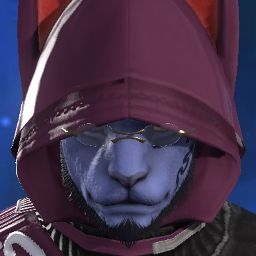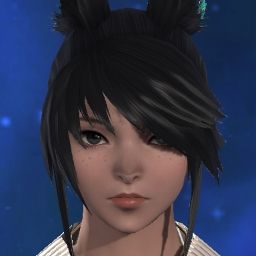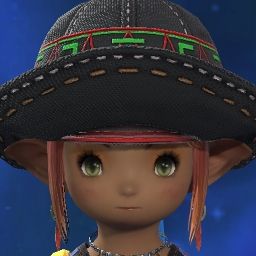I'm not sure how you can argue that G'raha is perverted, the WoL is his hero, his everything, if you were so inclined to be dramatic. also "Horse Fart"? am I missing a meme or something here?
-
09-12-2022 01:17 PM #61(5)
-
09-12-2022 01:33 PM #62
I don't mind localization as long as they don't take the liberty of rewriting quests and stories for the sake of appealing the Western players.
Let me tell you the story of Blade and Soul (I love the game, but hate the publisher). There was this section that involved your character going to the past directly to witness an event. The localization team thought this would make loopholes in the story and decided to rewrite it into "borrowing someone's vision of the past". They painstakingly changed dialogues so that NPCs would see you not a helpful stranger from the future, but someone they actually knew. However, despite their efforts, they forgot to change some lines from the original story who recognized your character decades later, so in a fight against loophole, they create a new loophole.
That and a bath-peeping quest where you help an impotent man, who is forced to marry the girl he peeps on because it is their tradition. It is deemed to extreme and the team felt sorry for the girl, so they decided to change it. Through localization, the NPC becomes a scholar who study cultural difference and marry the girl out of shared interest. Beautifully rewritten, right?(4)
-
09-12-2022 02:37 PM #63Player

- Join Date
- Aug 2016
- Location
- Amaurot
- Posts
- 275
- Character
- Teraq Moks
- World
- Behemoth
- Main Class
- Ninja Lv 90
I can answer that, as I play with the client in French with Japanese voice overs (I tried switching to the English client once, but Ye Olde English and the way the text was even more different to what basic Japanese I could understand were really distracting and I couldn't stand it).
I often speak with people who have played the game in English, and when discussing specific lines, there are way too often instances of "what the hell are you talking about" on both sides. Then I go check into my screenshot folder, unearth the specific line by comparing character poses with the English screenshot provided by my friend, and go "wait… it's this line??". That happens a little too often for my tastes.
Often it's because of the English localisation being weirdly vague and flowery, choosing to go with epithets over bluntly saying things, which sometimes leads to people misinterpreting things and incorporating that into theories that are… well, just plain wrong. FR has much fewer flourishes than EN, the price to pay for sticking closer to the JP script which is usually very straightforward. I know that results in the English script often being more fun and having the most iconic lines, and that is cool I'll give it that, but its vagueness tends to intrude in discussions in a way I really don't care for.
One example I readily remember is of Emet's lines in Ultima Thule. I know someone playing in English who thought some of his comments were praising/referring to the WoL, while the French script makes it obvious Emet is in fact talking about Venat, whether it is by naming her, or thanks to French's much more gendered grammar and the fact that my WoL is male. Amusingly, how omnipresent gender is in French also means I had a "wait… why does everyone act like we don't know Venat is a woman??" moment from 5.2 to the release of 6.0. Apparently her gender wasn't clear in the English version of the Anamnesis recording. Due to how French works, her gender being mentioned in the Scions' lines was inevitable, but there is no reason why English couldn't simply add a mention of "that woman, Venat" or something to that effect.
Another one I can think of happens during the Zodiark trial ("The Dark Inside" VS "Le Cratère des Martyrs" – though given that Japanese trial titles are usually extremely blunt I'm going to guess the original was something to the effect of "Zodiark destruction operation", and that EN vs FR here is simply a matter of their respective localiser bias, which is interesting to see) is Fandaniel going "My life's work! My masterpiece!". In French, he is talking about how long he has waited for this day where he would finally destroy everything. Innocuous enough, yeah? But the thing about this fandom, and how… ugh… bizarrely incensed discussion can get around certain parts of lore, is that some people interpret the English line as evidence the concept of Zodiark was built by Fandaniel himself, and go off that about how essential Hermes was to the Convocation – and I'm not going to go down the Story of Endwalker Sucked rabbit hole because that would be off-topic, but it's just an example that came to mind.
Y'shtola, at some point in 6.0, saying "'Twas Hydaelyn who forestalled the Final Days" is also a "technically true" doozy that can be wildly misinterpreted, while FR has her saying, a lot more explicitly, "by keeping Zodiark alive, she forestalled the return of the Final Days he had originally prevented".
I mean, taken in isolation, all of these are innocuous. But personally, it's a recurring annoyance in my talks with friends, and I've seen it needlessly influence lore discourse when the arguments shouldn't even exist in the first place. Because whatever else English might be, it is the language most used internationally, and thus the EN localisation is the one with the most weight in everyday discussion.(16)Last edited by Teraq; 09-12-2022 at 02:51 PM.
-
09-12-2022 03:02 PM #64Player

- Join Date
- Aug 2020
- Posts
- 2,724
- Character
- Deveryn Ev'liarsh
- World
- Excalibur
- Main Class
- Summoner Lv 100
In case it hasn't been mentioned, timing can be an issue with translation. As an example, those lengthy scenes in Praetorium will finish a lot faster in Japanese than they will in English. I switched over for the sake of hearing something different and I was ready to fight Gaius maybe 20 seconds ahead of everyone. Dialogue might have to be condensed or stretched to fit a time frame.
You can clearly see the difference in timing.(3)
-
09-12-2022 03:32 PM #65
Very well out, and thanks for the examples!
One other example, is when hydaelyn imbue our Azem crystal. In EN she said "... crystal original bearer", which leads to people, including me, assume that she's talking about emet. Since we know that Azem's crystal was made by him in secret. However, I thought to myself that it doesn't sound like what emet would say. It's only after I speak with my friend who play in other language, that apparently in JP, she said "... creator of this magic", which is very clear that it reference Azem. And that is much more logical than having the line said by emet.
Another smaller example was when the scion were talking in 5.5 (I think?), y'sthola said "we've seen firsthand the destruction brought by zodiark". Which is weird as hell because: 1)we haven't even meet zodiark yet, 2) zodiark never cause any destruction. If I'm not mistaken, in other language what she said was (paraphrasing) "it's up to us to not let zodiark be used to destroy the world". *If I'm wrong, please correct me(12)
-
09-12-2022 04:11 PM #66
Still waiting to find out how the English story is significantly different from the Japanese/French/German story because I haven't seen any sign of it. I know some of it is phrased differently but it's still the same story under the phrasing and doesn't suffer for the differences.
Maybe it would help to go into detailed examples of the differences between translation, interpretation and localization.
Here's a phrase that used to be heard a lot in English (not quite so much anymore):
Last night, my uncle kicked the bucket.
An older native English speaker is going to automatically understand that it means "Last night, my uncle died".
Someone doing a straight 1:1 translation into another language would translate it exactly as it looks: Last night, my uncle kicked the bucket. As in, my uncle took his foot and kicked a bucket across the ground or into the air.
But that's not the information to be conveyed to the non-English speaker. They need to be told the uncle has died.
Instead of translation, we turn to interpretation so the meaning of what was said is shared instead. Now, there's no misunderstanding on the part of the non-English speaker.
But what about localization? Where might that come in?
In some cultures, direct references to a person's death may be frowned on. You're not going to tell another person that someone died. You might instead say "My uncle is no longer with us". That's localization - changing what was said to be consistent with what is normal/acceptable for the other individual's culture.
Reverse it so the phrase "My uncle is no longer with us" is being spoken by a non-English speaker and translated 1:1 to an English speaker, the English speaker might respond "He's not? Well where did he go to? Will he be back soon?" Oops. Instead, it gets interpreted so the English speaker understands the uncle has died.
Translation is usually as much interpretation as direct translation because every language is going to have its colloquialisms that the translator has to work around. That's why we don't always get exact 1:1 translations and why localization is sometimes needed for concepts that simply do not translate and cannot be interpreted well.
On the subject of Haurchefant's spicy nature in JP and FR (don't know about DE) but not EN, that's easy enough to explain. The primary English speaking nations are still constrained by a rather Puritanical background where other nations aren't. His JP characterization fits easily into French culture. It doesn't in American or British culture, where such forwardness is expected to be done in private. That's why he was localized.
Was the game or Haurchefant's role radically altered by the localization? No. So why obsess over it?
Some posters in this thread need to go back and read the linked Reddit post that has the direct quotes from members of the localization teams on how the process works. To summarize:
The JP story team writes the story (the filler lore is still overseen by Oda-san). They share it with the EN localization team, that checks for what would need to be altered because a JP concept used may not work well in other languages. The JP team then reviews the EN feedback and makes adjustments. Eventually the teams working together with a final version of the story that will work in all localizations, even if phrasing and some characterizations have slight alterations.
There are not different stories for JP and EN. It's the same story. You're not going to get 1:1 translations because of differences in the languages but it is still the same story.
It would be fun if someone fluent in both languages could give us direct 1:1 translations (not interpretations) of dialogue from important story moments so we could see the results (and also to see just how accurate Google translate is with its 1:1 translations).(4)
-
09-12-2022 04:47 PM
Player
-
09-13-2022 02:30 AM #67
thanks for your well written response, I can start to see your point.
That said, maybe I'm a minority in the English speaking community, because I had no problems coming to the same conclusion as you did with only the English "translation". I have to say, these DO all seem innocuous to me. But, I don't really care about how other languages interpret it and honestly, if someone has a different take on a single line, I just don't care enough to be bothered. The story is the same. (all imo of course)(1)
-
09-13-2022 02:42 AM #68Player

- Join Date
- Oct 2013
- Location
- New Gridania
- Posts
- 5,465
- Character
- Hayk Farsight
- World
- Exodus
- Main Class
- Dark Knight Lv 100
But would such forwardness be taken well when your character is male? Remember, Haurchefant does this regardless of your character being male or female. Him doing it to a male would cause a lot of issues in the US and UK, due to how many people openly frown on anything even HINTING to same sex relationships.
(2)
-
09-13-2022 02:47 AM #69
-
09-13-2022 03:23 AM #70




 Reply With Quote
Reply With Quote











